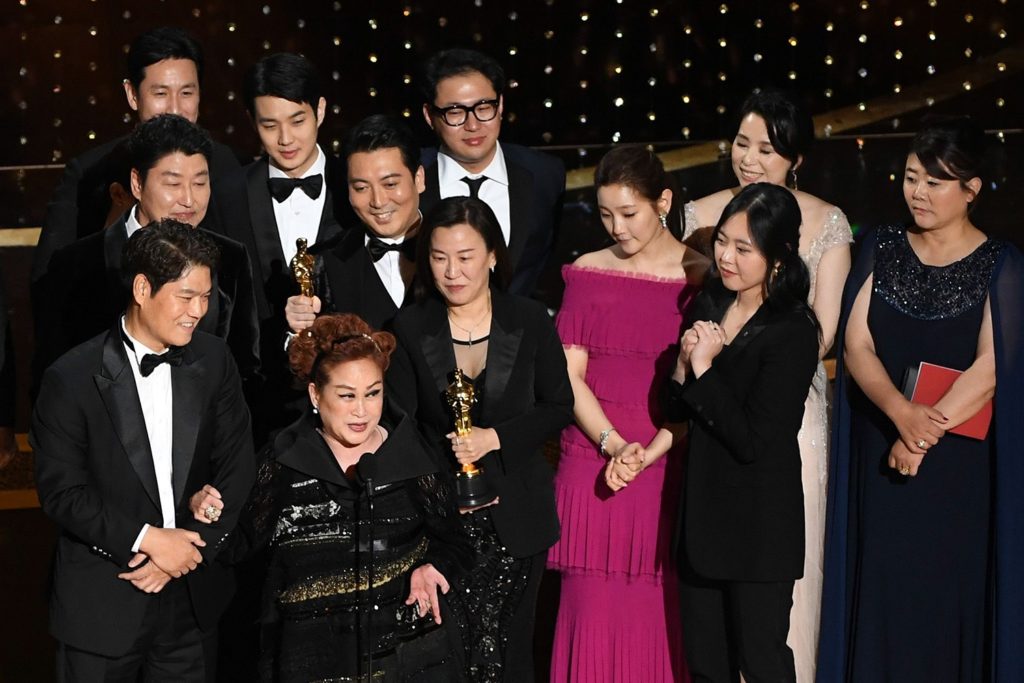By Geoffrey Cain
Foreign Policy
Feb 11, 2020
Miky Lee’s money and influence turned South Korean cinema into a powerhouse

“When I was young and studying cinema,” South Korean director Bong Joon-ho said in his Oscars acceptance speech for best director for his film Parasite, which also won best picture, on Sunday, “there was a saying that I carved deep into my heart, which is, ‘The most personal is the most creative’”—a quote he attributed to Martin Scorsese. But it wasn’t just Bong’s vision that brought Parasite to the screen; it was the institutional power of one of the most powerful Korean companies—and the personal quest of a single woman inside it.
After the ceremony, Western onlookers wondered why a scrum was gathering around a low-key Korean woman in the audience. That woman, Miky Lee, is the visionary behind South Korea’s film industry—an heir to the powerful Samsung empire and the vice chair of CJ Group, whose film subsidiary, CJ Entertainment, produced Parasite and a host of other award-winning auteur flicks from South Korea. I tell her story in new detail in my upcoming book Samsung Rising, due out this March. “She’s one of the producers who’s been working behind the scenes for decades. She’s built the vision, found the right people, and set up a business structure that has allowed Korean cinema to achieve what it’s achieved,” an acquaintance of Lee’s in Hollywood told me after the awards speech. “In our world of Korean film, I would say, yes, we’ve finally found that the most personal is the most creative—and that’s why we got this far.”
Until the 1980s, the idea of South Korea becoming a cinema powerhouse seemed absurd to most people. Sure, there was the rare excellent movie, like A Flower in Hell, directed by Shin Sang-ok and starring his wife, the actress Choi Eun-hee—a power couple so talented that North Korea kidnapped them and forced them to make propaganda films. Nevertheless, state censorship pervaded the paranoid military regime. The junta of the 1980s had an official policy of showing sleazy late-night cinema—full of cheap sex and gore and nationalistic pride—on state TV channels as prolefeed to keep the people happy. Between repression and B-movies, the country’s foray into serious cinema didn’t begin until the early 1990s following the transition to democracy in 1987.

That opened up new space for Korean producer-visionaries. Short, spunky, and with a flair for the arts, Miky Lee, whose Korean name is Lee Mie-kyung, then in her late 20s, came from an arm of the enormously wealthy Lee family that founded Samsung Group, South Korea’s most iconic business empire. The company makes the popular Galaxy smartphone and has its hands in seemingly everything, from apartments to fashionable clothing to South Korea’s largest theme park. But overseas, as a young Korean-language instructor at Harvard University, where she was doing a master’s in Asian studies, Lee was saddened by the fact that students passed over her Korean-language courses for Japanese, which was cool in the 1980s, and Chinese, which was useful. “My lifetime obsession to promote the Korean culture started then,” she told Bloomberg Markets in 2014. Lee’s cousin, reflecting on her accomplishments, told me: “[Lee’s] side of the family is different. They have the sense of freedom. They don’t really fit in and take orders.”
“My lifetime obsession to promote the Korean culture started then,” she told Bloomberg Markets in 2014.
The timing was perfect. The first generation of corporate founders of the chaebol—massive family-run conglomerates like Hyundai, SK, and Samsung—was dying off in the late 1980s and 1990s, opening the way for new leaders with new visions. And with the arrival of democracy in 1987, South Korea’s political leaders knew that this rising middle-class nation could not manufacture cheap cars and microwaves forever. It would need to enter creative industries in software, content, music, and cinema to sustain its economic growth story. “An advisor to President Kim [Young-sam] explained that the profit from a single film, ‘Jurassic Park,’ was equivalent to that from the export of 60,000 Hyundai automobiles,” the Los Angeles Times reported in 1996.
By the standards of chaebol heirs, Lee started at a disadvantage. After the death of Samsung founder Lee Byung-chul in 1987 and a family inheritance feud, his oldest, estranged son, Lee Maeng-hee—Miky Lee’s father—inherited the unglamorous arm of the Samsung empire, Cheil Jedang (later renamed CJ), a foodstuff and confectionary maker. His third son, Lee Kun-hee, inherited the crown jewel, Samsung Electronics, which emerged as a manufacturer of the latest semiconductor technologies, powering the PC revolution.
Wildly successful Japanese firms like Sony, awash in cash holdings, were snatching up marquee acquisitions, such as Columbia Pictures for $3.4 billion in 1989—and South Korea saw similar opportunities. For Korea, everything changed when Samsung Chairman Lee Kun-hee got involved. Once an aspiring film director who watched Ben-Hur and other classics 10 times or more, Chairman Lee appointed his niece Miky Lee to be a kind of artistic emissary to California on behalf of Samsung. According to numerous people who worked with her, Lee’s mandate was to ferret out acquisitions and partnerships for the chairman—in design, the arts, film, fashion, and advertising—that could elevate Samsung’s creativity beyond an electronics factory.
In 1994, Lee heard from a lawyer in Los Angeles that a famous Hollywood trio—Steven Spielberg, Jeffrey Katzenberg, and David Geffen—was looking for two or three suitors for their film start-up, DreamWorks. Convincing her uncle, Chairman Lee, that it was a smart business, Lee arranged a meeting for Samsung at Spielberg’s home in Pacific Palisades, California.
The talks broke down when Samsung kept bragging about its semiconductor successes all while demanding effective creative control over DreamWorks. “I kept on saying to them,” Geffen told the New York Times in 1996, that “if we were only interested in making money we’d also build semiconductor plants.” Former Samsung executives involved in the talks told me that Spielberg was asking for too much freedom—an unacceptable way to speak to the chairman, who was “treated like a god” at Samsung, dozens of them said.
As the chaebol set out on these California expansions, South Korea’s regimented corporate culture became a liability. With stakes in AST Research, then a top PC maker, and New Regency (then Regency International Pictures), one of the film studios behind 1990’s Pretty Woman, Samsung kept hitting the same roof and sometimes had to pull out, according to numerous people involved in the deals whom I interviewed. “I’d call the Korean headquarters, and I’d tell my bosses, ‘These are creative studios, and they’re the best in the world. They’re not here to pump out cheap Hyundai cars in high volume. You need to step back and let them do what they do best, or else you’re going to chase out talent. The world is not Korea!’” a former vice president involved in a major acquisition told me.
Lee was known among employees for her softer, more relaxed management style, a quality that helped her get access to the Hollywood elite. “She is not like Korean men, giving orders and expecting them to be followed,” her high school English teacher told the New York Times. “To do anything creative, you have to have a soft touch.”
After the Samsung-DreamWorks deal flopped, Spielberg’s trio, impressed with Lee, approached her again about getting seed capital—and in 1995, Lee’s new company, CJ, agreed to acquire a $300 million stake in exchange for Asian distribution rights and the golden egg: Lee’s filmmakers would be allowed to study under DreamWorks. A former Samsung consultant who worked with Lee said her DreamWorks deal was the catch that laid the groundwork for her success but that it was also a “slap in the face to the [Samsung] chairman,” swelling an ongoing family rift. As CJ and Samsung unwound their complex cross-shareholdings, Lee left Samsung and, with her brother, focused on transforming CJ from just a cheap food-maker to a successful film studio as well.
That marked the birth of South Korea’s modern film industry. But the early years were a struggle, in part due to the South Korean factory tradition being applied to cinema—too many competitors churning out low-budget films in high volumes. Economic crisis hit in 1997, shaking out poorly performing studios. Samsung Entertainment, a CJ rival, was forced to shut down in 1999 after just a few years of operation.
But the competition made the industry leaner and smarter. And CJ’s new film subsidiary, CJ Entertainment, guided by Lee’s eye for artistic success, began producing early hits like Joint Security Area in 2000, about North and South Korean soldiers who befriend each other at the Demilitarized Zone separating the two countries, and 2003’s Oldboy, a dark tale about a drunkard who wakes up in a cell and, after 15 years of captivity, is suddenly released to the outside world.
The Korean wave, as it was called, was taking off, building a loyal fandom for Korean film and music from around the world. But the ensuing decade showed the dangers of overhyping the arts under the guise of manufactured nationalism, as well as becoming overly dependent on a growing oligarchy of studios—including CJ—that cemented control over almost the whole process, from production to retail and distribution.
The Korean wave, as it was called, was taking off, building a loyal fandom for Korean film and music from around the world.
Dragon Wars: D-War, co-produced by CJ Entertainment and released in 2007, was a costly project played up as Korea’s first truly global film. Set in Los Angeles, with a multinational cast and crew, it told of legendary Korean dragons that came out of their slumber and waged war on humanity. But the film was widely panned for its cheesy acting, plot holes, and over-the-top special effects. A critic for the Boston Globe wrote that “there was no evidence that anybody involved with this laughable fantasy knew what he or she was doing.”
An animated film, Empress Chung, released in 2005 and produced by the well-known Simpsons animator Nelson Shin, was hyped as a groundbreaking, cooperative project between North and South Korean animation studios. But it grossed $140,000 on its opening weekend—a devastating loss for its $6.5 million budget—and then literally disappeared from the public domain after a few screenings in Europe. No DVD was released. Even today, it’s not available for streaming anywhere.
Amid these flops, Lee’s CJ Entertainment embraced a hands-off model when working with prominent directors, guaranteeing them full backing for their vision, even in the face of adversity. One breakthrough came in 2013, when Bong Joon-ho, who would later direct Parasite, released the brilliant Snowpiercer with CJ, about the miserably poor citizens who live in the back cars of a train that circles around a dystopian world, eating cockroach meat, and who ignite a class revolution against their overlords up front.
Though a hit in South Korea, the disgraced mogul Harvey Weinstein muted the film’s potential for U.S. success. He wanted to cut 20 minutes of nuanced dialogue so the film could be understood by “people in Iowa and Oklahoma.” “Harvey hated it,” Bong told Vulture.
Snowpiercer also made enemies with the censorious South Korean government of the increasingly authoritarian President Park Geun-hye, who put CJ on a blacklist from government funding and had the company assessed for its “growing left-leaning culture industry and recruitment efforts,” according to a confidential intelligence report sent to Park. Not helping matters was the trial and prison sentencing of Lee’s brother, CJ Group Chairman Lee Jay-hyun, for tax evasion in 2015. (He was pardoned in 2016.) Lee left her home in Seoul for Laguna Beach, California, citing ill health. “But it was really all those troubles, including health, that chased her out for a while,” a former CJ employee who knew her told me.
For all those troubles, Snowpiercer was the landmark movie that kicked off the 2010s, the decade that saw Korean cinema blow up with global, mainstream audiences. Korean filmmakers were wise to brush off the dull, decrepit profit motives of Weinstein—and the mass-produced movies of the past. While Bong’s films, with their often horrifying images, drew on the late-night shockers of his youth, they moved far beyond them.
Korean filmmakers learned to stay true to the personal—the most creative. They were honest about the social ills hurting Korean society, like the vast gulf between rich and poor, even as they were funded by the corporations that helped drive that inequality. And then they found growing, worldwide appeal. In 2019, the South Korean film industry raked in $1.61 billion—compared with $370 million in 2004, back when the industry was releasing its first big hits. That culminated in Parasite’s triumph. And Miky Lee, once a small-time upstart breaking into Hollywood, later blacklisted by her own government, made her comeback.
Geoffrey Cain is a writer on Korean affairs and the author of an upcoming book on Samsung from Crown.
The article was originally published in Foreign Policy
See Also:






